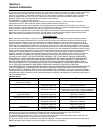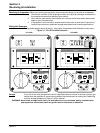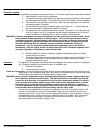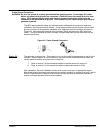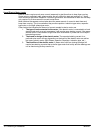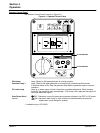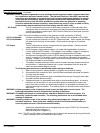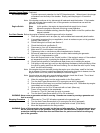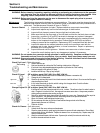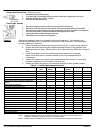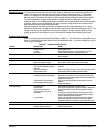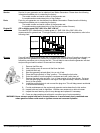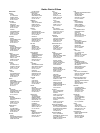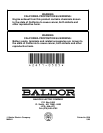
Troubleshooting and Maintenance 5-3MN2411
Voltage Variations
This generator set must be run at its proper speed to obtain the correct electrical power at its
output. All engines have a tendency to slow down when a load is applied to it. The engine
governor is designed to hold the operating speed as nearly constant as possible. When the
electrical load is increased, the engine is more heavily loaded and engine speed drops slightly.
This slight decrease in engine speed results in a slight decrease in generator voltage and
frequency output. This voltage and frequency variation has no appreciable effect in the operation
of motors, lights, and most appliances and tools. However, timing devices and clocks will not
keep perfect time when used on this generator.
Reduced voltage to the load can also be caused by using the wrong extension cord. Small
diameter wire will have a voltage drop across the cord when current flows through the wire. This
voltage drop can be very significant over long cord lengths. Always use the proper wire size
(gauge wire size) for the extension cord to minimize the voltage drop at rated current draw.
Problems and Solutions
Some of the more common problems are listed in Table 5-1. This information is intended to be a
check or verification that simple causes can be located and fixed. It is not an exhaustive “how to”
for all types of problems.
Table 5-1 Troubleshooting Guide
Problem Possible Cause Remedy
Engine will not start
No fuel.
Restricted air flow.
No spark.
Low oil level.
Check that fuel valves are ON. Check fuel level in fuel tank.
Check/replace air filter.
Check/replace spark plug(s). Verify engine switch is in Run".
Oil sensor will prevent engine starting if oil level is low.
Engine will not crank (electric start) Dead battery. Remove battery and trickle charge or replace with new battery.
Never Jump Start.
Engine starts but will not run smoothly Fuel or ignition problem Have engine serviced.
Engine overheats Excessive load
Debris or dirt buildup on engine
Remove one or more electrical loads.
Remove debris. Clean engine surfaces to allow cooling.
No output voltage Ciruit Breaker tripped or defective.
Loss of residual magnetism in exciter
field poles.
Open in stator windings
Defective exciter circuit.
Reset circuit breaker or replace if required.
Flash field.
Check for continuity in windings. Return to factory for repair if open.
Check/replace diode and capacitor and flash the field.
Output voltage varies Irregular speed (fixed speed mode)
Fluctuating speed (fixed speed mode)
Loose terminal or load connections
Defective bearing (uneven air gap)
Check engine for malfunction or load for fluctuation
Stabilize load. The addition of a lamp load (resistance load) may
compensate partially for load changes caused by intermittent motor
operation. Do not overload.
Verify all connections are proper and check tighness torque of
terminals.
Replace worn bearing
Low output voltage Low engine speed
Excessive load
High resistance connections −
connections will be warm or hot
Shorted field
Low power factor
Check that the Auto Idle switch is in OFF position.
Check engine for malfunction or system for overload. Reduce load.
Verify all connections are proper and check tighness torque of
terminals.
Test field coils for possible short by checking resistance with an
ohmmeter or resistancebridge. Return rotor assembly to factory
forrepair if alternator field coils are shorted.
Reduce inductive (motor) load. Some AC motors use about the
same current regardless of load. Do not use motors of greater
horsepower rating than is necessary to move the mechanical load.
High output voltage Excessive speed (fixed speed mode) Check engine for malfunction
Electrical shock when frame is touched Static charge.
Grounded armature or field coil.
Ground generator frame at local reference ground (see Section 3).
Return to factory for repair



